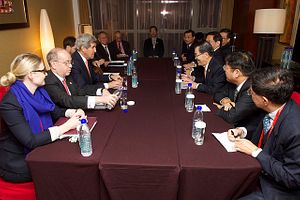There is big trouble brewing in “Little China” – the Republic of China (Taiwan). The time has arrived for the U.S. Department of State to spearhead a detailed interagency policy review of America’s relationship with Taiwan with a special focus on its security commitments to the island. Numerous considerations point to the need for such a study.
Every American is familiar with the rise of China. The U.S. needs China’s cooperation to cope with a wide range of pressing global problems, including worldwide economic challenges, terrorism, proliferation of weapons of mass destruction, environmental degradation, health issues, dwindling energy supplies, and the sporadic crises on the Korean Peninsula to name just a few. Moreover, China is now the world’s second largest economy, one of the world’s fastest growing economies, third largest military power, and the single largest foreign holder of U.S. government debt. The changes occurring within China are astounding. But some things remain constant – including Beijing’s steadfast opposition to Washington’s military support for Taipei. U.S. decision-makers are painfully aware that, while American support for Taiwan is not the only issue that divides Washington and Beijing, it is the most contentious and longstanding problem. So lobbyists are correct when they claim that “Taiwan matters.”
Relations between Taipei and Beijing have improved enormously since 2008. However, the military buildup opposite Taiwan continues. In 2015, China’s “official” defense budget climbed 10.1 percent to approximately $141.5 billion. This marked the 24th consecutive annual increase in defense outlays. A major focus of the military modernization program appears to be improving China’s ability to conduct military operations against Taiwan and to deter, delay, and deny U.S. intervention in a cross-strait conflict. In other words, the cost of U.S. intervention in a Taiwan crisis is mounting.
Meanwhile, defense spending in Taiwan is trending downward. Taiwan’s military budget as a percentage of GDP has dropped from 3.8 percent in 1994 to 2.0 percent in 2014, and from 24.3 percent of total government spending to 16.2 percent in the same period. Troop levels dropped from 450,000 in the 1990s to 210,000 in 2014. More cuts are on the horizon. Some hope the arrival of a new president and administration in 2016 will reverse this trend. But security analysts remain skeptical. Military spending is unpopular in Taiwan.
Internal trends in Taiwan hold the potential to complicate U.S. security policy. Most people on the island now identify themselves as Taiwanese rather than Chinese. Moreover, opinion polls conducted in 2013 show that 37.7 percent of the people now support de jure independence from China even if it causes the mainland to attack the island (76.1 percent support independence if the mainland does not attack). Perhaps equally worrisome for Washington, a majority of the Taiwan population believes that the U.S. will send troops to defend them if a declaration of independence leads to war with China. And a growing number (almost 40 percent) do not think the Chinese threat to attack the island is credible. This comes at a time when support among the American people for U.S. military action to help Taiwan defend itself has dropped to an all-time low. According to a poll conducted in 2014 by the Chicago Council on Global Affairs, the overwhelming majority of the American public (71 percent) opposes sending troops to defend Taiwan if it is attacked by China.
Many predict that Taiwan’s Democratic Progressive Party (DPP) will return to power in 2016. The party has sought to “rebrand” itself as a “responsible” alternative to the ruling Kuomintang (KMT). But U.S. defense planners cannot help but wonder if the DPP will seek to entrap the U.S. in a cross-strait crisis in an effort to achieve its dreams of independence from China. Tsai Ing-wen, the DPP presidential candidate, has done little to assuage such fears. The candidate’s positions on many of the most important issues of the day remain opaque and unclear, especially her plans for handling relations with Beijing. And despite its lead in the polls, there are concerns that the DPP has given up on democracy. For example, it is reportedly embracing a Middle Eastern practice known as “rent a mob” and subsidizing extremists who attack Taiwan’s government ministries. This makes it increasingly difficult for Americans to sensibly argue that Taiwan is a “model of democracy.”
The U.S. is Taiwan’s primary security partner and the only country that might provide it with military support in a conflict with China. In the event of war, there will be no “coalition of the willing.” America cannot expect assistance from Canada, Australia, or any country in Europe. When discussing America’s failure in the Vietnam conflict, the late Robert S. McNamara, former U.S. Defense Secretary, warned that if the U.S. cannot persuade governments with similar interests and similar values of the merits of multilateral military action, it should think long and hard before proceeding unilaterally.
The world is changing. But the fundamentals of U.S. policy toward Taiwan have not changed for decades and U.S.-Taiwan security ties remain largely frozen in time. Many policies that were deemed necessary in the 1970s are obsolete today. Does this observation apply to America’s defense relationship with Taiwan?
To be sure, this question makes some uncomfortable. And Washington should not rush to strengthen, revise or repeal the U.S. security commitment to Taiwan. However, it makes little sense to adopt an inertial approach to the matter. Irrespective of one’s position toward the Taiwan issue, there are questions about this bilateral defense relationship that deserve thoughtful study and debate among Americans at both the popular and elite levels.
Dennis V. Hickey is Distinguished Professor of Political Science and Director of the Graduate Program in Global Studies at Missouri State University and the author of numerous books and articles about U.S.-Taiwan security relations.

































